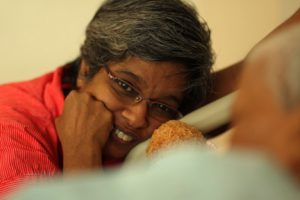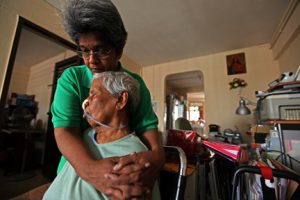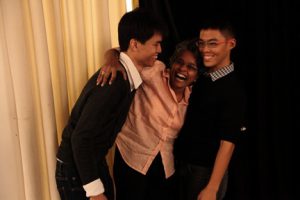The power of stories
Telling stories before we forget, two young passionate men share their feat to reduce stigma of dementia and provide support for caregivers.
BY: Joanne Tok
When one shares about a story about himself or herself, minds are thrilled, hearts are stirred and even lives can be changed. Two passionate individuals, Jeremy Boo and Lee Xian Jie, 24 and 23 years old respectively, believe in the power of stories and they hope that through this, they will be able to reduce the stigma of dementia and provide support for caregivers through their website and their documentary. Agelessonline talks to the two to find out their motivation and where they hope to take their site to:
What made you decide to start an online platform called “Before We Forget” on dementia? I understand that you were both in National Service at that time. When did you launch the site?
We embarked on this project for two reasons. Firstly, we believe that neurological disorders will be the cancer of our generation. While we have treatments for cancer today, we do not have any effective treatments for neuro-degenerative diseases, which are chronic and terminal. To exacerbate matters, these disorders will only rise with an ageing population.
The second reason stems from Jeremyʼs personal experience of taking care of his mother who has Amyotrophic Lateral Sclerosis (a motor neurone disease, ALS is also known as Lou Gehrigʼs Disease). With his own caregiver’s experience, he wanted to create more awareness through what he was good at.
When we graduated in 2009, we researched in preparation for a documentary about ALS but our subjects in both families passed away before filming commenced. Besides, it was also difficult to find more people with ALS as it affects very few (approximately one to two per 100,000 people). Researching on alternatives, we soon found out about dementia as one of the neurological disorders that affect the most number of people. We wanted our work to reach out to as many people as possible and dementia, being so prevalent yet so invisible, was the ideal choice.
It was invisible because the stigma of dementia is two-fold – the first stems from the misconception that dementia is a mental illness (the stigma of mental illness is equally undesirable and we might focus on that next) and the second from the stigma of ageing, death and dying. Those who have placed their parents in nursing homes face an added stigma of unfilial conduct even if a nursing home might be best option in certain circumstances. The stigma of dementia compels people to remain silent, and this silence reinforces the belief that dementia is wrong and shameful.
With all these in mind, we went out in search of people with dementia. We wrote to dementia/caregiver organisations and visited all nursing homes with dementia facilities to look for appropriate subjects. We spent half a year searching to no avail; it was difficult to get consent and those who had consented were not suitable (usually due to limited access to the person’s life and family).
We met our two protagonists almost by chance. We first spoke to Joyce Fernandez (above) when we contacted Alzheimer’s Disease Association (ADA). Although we did not manage to collaborate with ADA, Joyce soon left ADA to care for her mother full-time and agreed to work with us in her personal capacity.
Jeremy met Dr Wong Ting Hway on a completely unrelated affair. She found out that Jeremy won the International Committee of the Red Cross’ (ICRC) Young Reporter Competition. As a former ICRC employee, she wanted to share with Jeremy her experience of working in an area of armed conflict before he left for one. About to leave at the end of our three-hour long conversation, Jeremy casually told her about our work at “Before We Forget”. “Oh, would you like to speak to my mother?” she replied with equal nonchalance.
It was how we met our subjects and it was with similar serendipity that the two families share vastly different value systems and socioeconomic backgrounds. This added another dimension to the film and, by extension, to the experience of anyone watching it.
Caregiving is universal whether caring for someone with Lou Gehrig’s or Alzheimer’s. Can you share your own caregiving experience with your mother, Jeremy? How old is your mother?
Boo: Caregiving, I slowly realised, is not a one-dimensional affair. While I expected sorrow and grief, I was not prepared for anger, guilt, denial, and physical, mental, and emotional exhaustion. These emotions run in a circle, drawing in tighter and tighter, feeding off each other. Neuro-degenerative diseases do not affect just the person with it, but also the loved ones of that person. My mother is 54 years old.
What was the main purpose in starting the online platform?
We want to encourage people to share their own stories about dementia. We are happy to say that about half of the stories are from young people.
How many people suffer from Alzheimer’s in Singapore?
More than 22,000 Singaporeans have dementia. These numbers are expected to increase eightfold by 2050.
We believe that one of civilised society’s greatest transgressions is it stops treating people like people. People are now often defined by numbers – by the money they make, by the years they live, by the children they have, etc. Even in dementia, we are so focused on the numbers – the incidence rate, the prevalence, the prognosis, the symptoms, the subsidies, etc, that we forget that people with dementia are people too.
In a way, we believe that stories help restore empathy. And film-making, like writing and photography, is just one of its many forms.
What are some of the issues surrounding the disease?
When we were looking for subjects for this story, we realised that many were not willing to come forward because of the stigma of mental illnesses (even though dementia is not a mental illness) and end-of-life issues. Out of about 20 potential subjects, only two families welcomed us into their private lives. We are very grateful to both families for providing such an intimate level of access to their private lives because without their complete trust we would not have been able to make the film.
This stigma makes it more difficult for people to learn more about dementia and stifles conversation about end-of-life issues. Consequently, we hear of stories of people with dementia locked at home because their children do not understand why their parents are wandering outside; people with dementia who have to be restrained to their beds because they keep pulling out feeding tubes that were inserted, even though there is no evidence that feeding tubes necessarily improve quality of life; people with dementia who are sedated and intubated, alive only because of machines that pump blood, and forces air into their lungs.
When we made this documentary, we wanted to observe, for a year, the lives of people with dementia and their caregivers. We merely wanted to tell the stories of these people so that others may understand and empathise with them.
We are under no illusion that this documentary will provide a cure or a solution. But we are convinced that this documentary, coupled with our online platform, which was launched in January 2011, will foster conversations about dementia and end-of-life issues and it is these conversations that will make the lives of people with dementia and their families more comfortable.
How did the video portion come about?
The documentary was planned from the start and the website was a natural addition. We both studied Mass Communications in Ngee Ann Polytechnic and were trained as journalists so we were already very familiar with using words and photography to tell our stories, and video was something we always wanted to try experimenting with.
Can you share what your weekdays would be like involved in the project?
We worked on the documentary during our National Service so we spent weekends and holidays following our subjects. We are also continually working to maintain the website and Facebook page, besides working on commercial projects.
Can you share some of your reflections from the two interviews and what lessons you learned?
We interviewed each subject many times over in the documentary and chose the strongest moments for the documentary. We ended up with a hundred hours of footage and spent hundreds more in between shots. Because we didn’t have a lot of money, we had to work on everything – pre-production, website design, production, editing, posters, etc, and in the process we made mistakes that taught us more than we could expect to learn in school.
We were also very impressed by the resilience and strength of character all our subjects showed despite the ups and downs in that one year.
When did the filming start and end? I understand it was screened at the Arts House in September, how was the response? Are you planning to screen it again this year?
Pre-production started in April 2010, we started filming in June 2010, completed filming in September 2011, and post-production took about a month. The screening at the Arts House was a Preview Screening for media and invited guests; we had a full house for the two screenings held.
It will be premiering at the Southeast Asian Film Festival on March 24, 2012 at the Singapore Art Museum – http://beforeweforget.org/campaign-news/2012/02/seaff/. There will be other screenings in Singapore and overseas announced at a later date.
How has the response been to your online platform?
There have been more than 40 stories from Singapore and Malaysia, sharing their thoughts and experiences. We have some submissions from Hong Kong, which we are planning to publish soon, and there are plans to collaborate with dementia-related organisations in Japan and the Philippines, and we are looking for more stories from around the Asian continent.
Can you share one or two stories that touched you from your online platform?
- Tara Tan’s Grandma’s Wail: http://beforeweforget.org/your-stories/2011/06/tara-tan/
- Dr Wong Ting Hway’s Rewriting the Obituary: http://beforeweforget.org/your-stories/2011/05/rewriting-obituary/
You also held a photo exhibition at three locations in Singapore. Where did you get the stories and pictures from? Did they come from your site?
The photos were from the Photo Challenge we held and some were by us. You may refer to: http://beforeweforget.org/exhibition/.
Did you receive funding to do this project and where?
The Lien Foundation provided seed funding to start the website and the documentary, but we had to eventually put in a substantial amount of our own savings when we realised we wanted to make a full-length documentary instead of short videos which we initially planned for. Health Promotion Board Singapore generously supported “Before We Forget” by sponsoring the three exhibitions we held last September.
 Your wish-list for Singapore –
Your wish-list for Singapore –
• What should the Government do?
The Government has been doing all the right things, looking into Medisave use for dementia, which was previously not classified as a chronic illness qualifying for long-term treatment subsidies. More needs to be done for dementia medication subsidies but the Ministry of Health is doing a good job.
More day-care centres specially meant for people with dementia need to be set up, and we need more medical staff trained to interact with people with dementia. There has been much work by the ministries involved to set up more of these centres. With day-care centres in place, fewer families will have to place their loved ones in nursing homes because they will be cared for when their family members are out at work. Last year, The Salvation Army set up the Bedok Multiservice Centre, which provides dementia care and this is a new addition to the New Horizon Centres by the Alzheimer’s Disease Association. There are also services by MCYS to bring people with dementia to their hospital appointments, where those who require follow-up medical appointments can receive escort/transport services to and from their homes.
The Health Promotion Board has also been working on a public awareness campaign that has been running for a few years now. However, the campaign faces the problem of continued stigma, which can only be gradually de-stigmatised by the public – people like you and me.
• What should caregivers do? What should the public do?
Stigma can only be destroyed with conversations, so people should speak to their families and friends about dementia and discuss what they would like to be done in the event they have dementia. People with dementia and their caregivers can start these conversations by sharing their experiences with others.
What’s next for the two of you? Where will you be heading? A continuation of the project?
We run Hachisu to work on commercial projects. The business enables us to continue our reportage and we are currently researching new stories and documentaries. These documentaries have not been confirmed but our interest lies in neurological and mental health issues. We are still collecting stories for the “Before We Forget” website from around the region. We also intend to publish a book of stories this year and we’re looking for corporate sponsors to be involved. This book will comprise photographs, illustrations, poetry and prose, of which some will be by contributors from “Before We Forget” website.




0 Comments